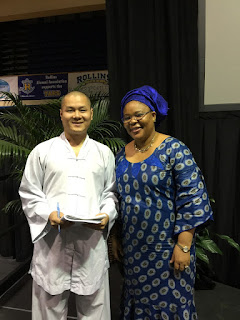Quang Le
Having a chance to listen to a
Nobel prize winner’s speech is an enlightenment. Leymah Gbowee, 2011 Nobel
Peace Laureate, is an author and a great human rights activist. After listening
to the speech, many people admire her great dedication. For most of the
audience, her greatest achievement is to unite Christian and Islamic women to
peacefully protest for women’s rights. After the talk, many people waited in a
long queue to take a picture and interview her, but the writer was the unique
student who had a chance to interview her!
Leymah Gbowee was born on January, 1st 1972 in Liberia. She has a
master degree in Conflict Transformation from Eastern Mennonite University,
Virginia. She is the president of Gbowee Peace Foundation Africa. Living in
Ghana, Mrs. Gbowee tries to bring peace to this continent. “Pray the Devil Back
to Hell” is the film about her hard work in Africa that qualifies her for
the 2011 Nobel Peace. Now she tries to solve conflicts in other parts of the
planet including (North and South) Korea, Asia. Humorously, one of the most
common questions she is having asked is about her insights to inspire Liberian
wives to stop sex with their husbands until they stop the family’s violence.
On September 16, 2015 people went to Rollins College at 7 p.m. to enjoy her
presentation. There are about six hundred people there including a few
classmates. Mrs. Maroon, the professor of Happiness and Culture class and Mr.
Carpenter, the English-300 professor were there also. At 7:45, after a
respectful introduction from the president of Rollins College, 2011 Nobel Peace
Laureate Lymah Gbowee appeared and was met with the joyful and continuous
applause. Her topic was Leading Change Through Activism. It lasted for an hour.
First, she told about her story: young, smart (top ten in the high school),
ambitious. She wanted to become the first doctor in her family. However, the
war erupted and changed everything. Sometimes, she had to live on only water.
Before the war, the Christian and Muslim people lived in harmony. The kids were
cared for by the community without religious discrimination. That changed;
people killed each other based on ethnicity and religion. She prayed for God to
stop the war, but the war continued. She started to consider learning how to
help people and to tried to find a good way to stop the war.
The
violent conflict happened in many places resulting in injured and dead people,
so she gathered women to pray for them. It was the first successful time that
she united women. Then she encouraged women to unite for peace, “It’s the time
for you to do something, it’s the time for you to do something,” she said. She
went to the mosques, the markets, and the churches to deliver the peace
message. The number of women involved quickly raised from twenty to over three
hundred people in under one year. Then, she wanted to arrange for a mass action
campaign, “Money never brings ideas; ideas bring money. Money never brings
change; ideas bring change.” The movement increased; it spread to other
countries.
In 2005, she encouraged women in
her country, “It’s the time to fight for democracy.” Learning democracy and women’s rights from
America, she worked toward women’s participation in elections in her nation. As
the result, in 2005, Mrs. Sirleaf became the first female president of
Liberia. “Activism is not something that lasts for one day,” she said. Nelson
Mandela spent twenty five years in prison for trying to free his country. She
also tells about Mahatma Gandhi as a hero of freeing India. Martin Luther King
was described as the great hero of American democracy and of the world, too. At
the end of the speech, she repeats many times, “Activism for change...” Then
she stops to a big round of applause.
“What make you happy?” asked the M.C. Children with their hopes and
actions, she answers. After a a few answers, Ms. Gbowee officially finished her lecture. The writer
joined a long queue to take a picture and interview her.
“What do you attribute your success to? ask the
writer.
“Work.” She answers. Perhaps she is tired.
“What do you think about religion?”
Interestingly, she answers so long
that many people often think their religion is the best while ignore the values
of other religions. They even blame those beliefs. This is the main reason for
religious conflicts. Tolerance is always the solution. One needs to know that
other people also have suffering and happiness like he/she has. Also, we need
to accept weaknesses from other religions because our religion is not perfect.
Instead of blaming, we need to unify religions in order to make a change in
community, in nation and beyond.
“How can people invite you to Vietnam, a developing
country?”
So tired, she says thank you in
whisper and writes down in the writer's notebook her special email address.
2011 Nobel Peace Laureate
Leymah Gbowee and the writer

No comments:
Post a Comment